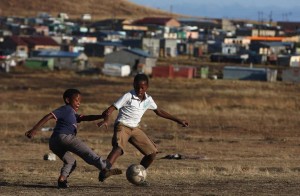From the United Nations to Schools to Non-Government Organizations sport has been recognized as an extraordinary way for people to learn to become better people. Not only is sport a physical and mental activity, but it is an emotional one also. Think about the last time your favourite team or player or rider won (or lost) and what your emotional response was to that. Sport can divide, but it can also bring together. Sport is literally about participation, team work, self reliance, reliance on your team or bike or ball or caddie or horse. It is about respecting the system, forgiveness, highs and lows, emotional connections, social, essential and geographical identity, it’s about citizenship and patriotism. But it is also about humility and being able to recognise that winning comes in many forms, and that lessons, however hard to learn, are important. This to me, is such a reflection of life. And because of all of this, sport is a great teacher, both to those of us who play and those of us who watch.
The Beyond Sport Summit has been taking place all this week in Cape Town. It ended on 8 December 2011. The Summit is an annual event where participants can make use of networking opportunities as well as participate in collaborative workshops in order to propel social change through sport. That is what Beyond Sport is all about, using sport to inspire and motivate social change. What a fitting and wonderful concept, especially at this time of year, which is all about giving, sharing, upliftment, reflection and generosity.
I’ve witnessed first-hand the power sport can have on communities and to see so many people in one room talking about they can use this power for good was a humbling moment. Beyond Sport can achieve great things. Archbishop Desmond Tutu, Patron of Beyond Sport
Beyond Sport also offers awards for projects that are happening around the world where sport is being used in the spirit of reconciliation. There are entrants literally from countries ranging from Nepal to Afghanistan. South Africa also has an entry and all the finalists from each category have been invited to participate in the Summit in Cape Town. Here is an example of an incredible use of sport in rebuilding a broken country. Sierra Leone’s Play 31 Project is one of three projects nominated in the ‘using sport for conflict resolution’ category.
Sierra Leone suffered one of the most brutal civil wars in recent history, leaving the country torn apart. Brother turned on brother and young men were forced to kill elders and rape women. The social fabric of this traditional country was destroyed. Although The Special Court for Sierra Leone and the Truth and Reconciliation Commission both did a good job in promoting transitional justice, little has been done to facilitate and carry out actual reconciliation at a micro-level among the people who suffered the most. The war left in its aftermath extreme poverty and underdevelopment and there are scores of challenges facing the country today. While political solutions are needed, these challenges are remarkably difficult to tackle in the absence of a pervasive culture of unity and tolerance. How can citizens form a productive work force, gain trust in their politicians and the rule of law, or make strides as a country if they haven’t yet recovered from the wounds of war and addressed the traumas it left? By organizing community tournaments, social gatherings, and peace workshops, we bring together and educate people who have lived through the civil war, thus facilitating a process of people coming together across divides. Our program promotes reconciliation and contributes to the development of a peaceful and tolerant society.
If you would like to read more about some of the extraordinary things people are doing around the world, using sport to heal, click here.
I think in the New World of Work where there is so much to learn about change and how to do things differently, I think sport can be a great teacher. Not just because it provides a methodology for social, educational and economic development for young people (which is of course fundamentally important), but also for decision-makers, there are many lessons to be learned about the self and how we manage others.
Especially as we go into the time of year for reflection and consideration, ponder over perhaps what you could do differently next year to uplift your community. Whether that is your domestic community or community at the office. Perhaps a day with one of the projects mentioned on the Beyond Sport websites would teach you and or your team a thing or two, or at least provide you with some ideas.
What else can we learn from?



